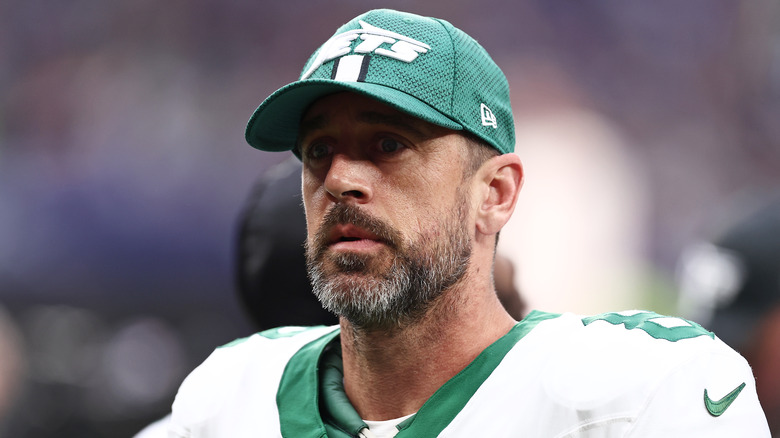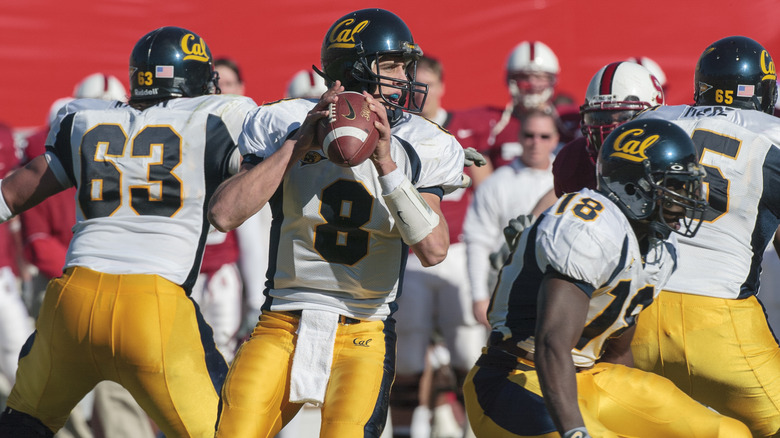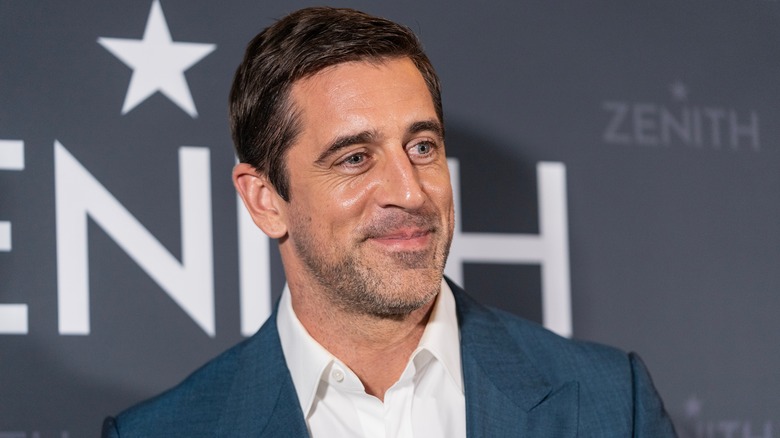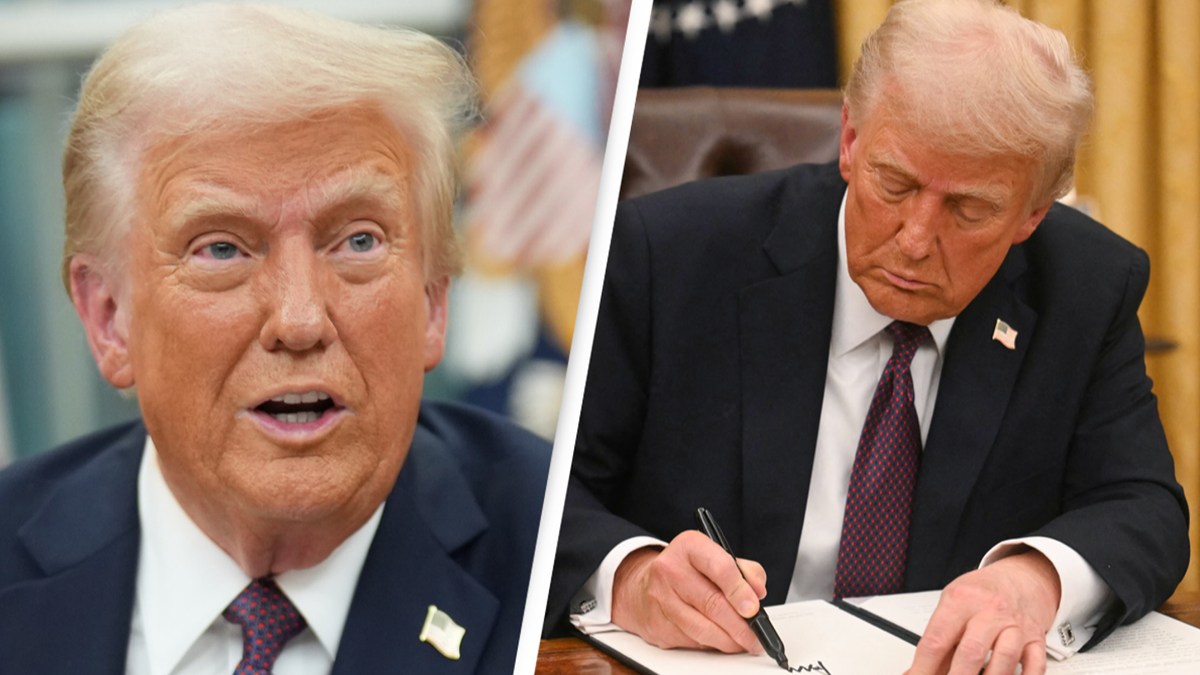
Naomi Baker/Getty Images
Athletes tend to get a bad rap for, let's say, not being the sharpest tools in the shed. And sure, stereotypes exist for a reason — think back to the jocks you knew in high school. Most of them barely cared about homework and were laser-focused on making varsity, not memorizing the periodic table. They were star athletes, sure, but future scholars? Not so much. However, when it comes to professional athletes, Aaron Rodgers is reportedly one of the rare exceptions, as he's also known for having brains that match his brawn.
Case in point: Rodgers won "Celebrity Jeopardy!" in 2015, beating "Shark Tank" investor Kevin O'Leary and literal astronaut Mark Kelly. He walked away with $50,000, which he generously donated to Midwest Athletes Against Childhood Cancer — because, apparently, he's both smart and charitable. On the field, Rodgers' smarts are equally impressive. His high school coach, Ron Souza, once told the New York Post that Rodgers thinks about football like a strategist. "Aaron Rodgers is about the 'why.' Why it works. Why something doesn't. What creates an advantage? He learns entirely differently," he said. "It's what makes him tick. It's not just football. It's how he is with everything in life. That's how he operates. He could just see the game so clearly. It's like 'A Beautiful Mind.'"
Given his knack for problem-solving both on and off the field, it's clear Rodgers isn't your average athlete. And if reports are accurate, his smarts extended to the classroom, too — he supposedly maintained a 3.9 GPA during his university years. Not too shabby for a guy who's best known for launching passes!
Aaron reportedly had an impressive 3.9 GPA and scored 1310 on the SAT

David Madison/Getty Images
You might not picture Aaron Rodgers as the type to hit the books hard, but apparently, he did just that during his school days. In high school, the guy managed to maintain a 3.9 GPA and scored 1310 on the SAT, all while being heavily involved in sports. In fact, there was purportedly a moment when he considered ditching football entirely to pursue a career in law.
Despite his mom's initial hesitations, Rodgers chose to play football at Butte College, where he found himself competing against guys in their 20s while he was just 18. And he didn't just hold his own — he excelled both on the field and in the classroom. According to Marca, Rodgers maintained that impressive 3.9 GPA at Butte, which dipped slightly to a 3.6 after he transferred to the University of California, Berkeley. It's no surprise, really, since his former Butte teammates told the New York Post that Rodgers was anything but the life of the party back then. "He was down-to-earth, reserved, very serious academically," center Rob Christie said.
But even if this is the case, Rodgers wasn't exactly the teacher's pet either. He once shared a story about how a professor at UC Berkeley gave him an F on an assignment and threw in some unsolicited life advice, claiming he'd never make it big. "She said, 'You'll never make it. You'll get hurt,'" Rodgers recalled in a "Tuesday's with Aaron" episode. "I said, 'OK,' I said, 'I don't agree with any of that.' I just want to tell that teacher right now today, thank you for adding to that chip on my shoulder, and I hope you are a fan."
But his controversial views often raise eyebrows

lev radin/Shutterstock
Aaron Rodgers may have the brains, but plenty of people think otherwise, thanks to some of his more controversial opinions. He's found himself in hot water more than once — like when, at the height of the COVID-19 pandemic, he told the media he was "immunized," only for it to come out later that he was actually unvaccinated. That little detail earned him a penalty for breaching NFL safety protocols. Oh, and then there were those rumors swirling around that he questioned the events of 9/11 and allegedly believed the Sandy Hook tragedy "never happened," according to a CNN report.
Rodgers, of course, denies all of this. Regarding the vaccine controversy, he's adamant that he forms opinions based on his own research, not because of public pressure. "I would have said, 'I'm not some sort of anti-vax, flat earther. I am somebody who's a critical thinker,'" he said during a "The Pat McAfee Show" interview. "I believe strongly in bodily autonomy and the ability to make choices for your body. Not to have to acquiesce to some woke culture or crazed group of individuals who say you have to do something."
But despite the backlash he gets for his opinions now and then, Rodgers somehow still managed to score a doctorate — okay, it's honorary, but still. The Medical College of Wisconsin awarded him the degree for his charitable work. So, technically, that's Dr. Rodgers to you!









/cdn.vox-cdn.com/uploads/chorus_asset/file/25841146/google_face_control_chromeos.png)









 English (US) ·
English (US) ·